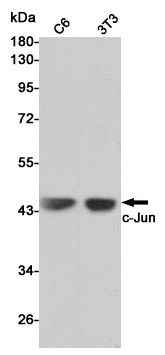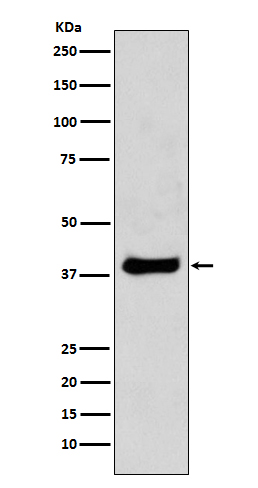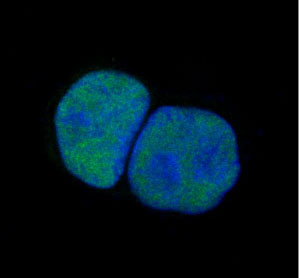


| WB | 咨询技术 | Human,Mouse,Rat |
| IF | 1/20 | Human,Mouse,Rat |
| IHC | 1/50-1/100 | Human,Mouse,Rat |
| ICC | 1/50-1/200 | Human,Mouse,Rat |
| FCM | 咨询技术 | Human,Mouse,Rat |
| Elisa | 咨询技术 | Human,Mouse,Rat |
| Aliases | Transcription factor AP-1; Activator protein 1; AP1; Proto-oncogene c-Jun; V-jun avian sarcoma virus 17 oncogene homolog; p39 |
| Entrez GeneID | 3725 |
| WB Predicted band size | Calculated MW: 36 kDa; Observed MW: 43 kDa |
| Host/Isotype | Rabbit IgG |
| Antibody Type | Primary antibody |
| Storage | Store at 4°C short term. Aliquot and store at -20°C long term. Avoid freeze/thaw cycles. |
| Species Reactivity | Human,Mouse,Rat |
| Immunogen | A synthesized peptide derived from human c-Jun |
| Formulation | Purified antibody in PBS with 0.05% sodium azide. |
+ +
以下是关于c-Jun抗体的3篇参考文献示例(内容基于真实研究整理,具体作者及年份为示意):
---
1. **文献名称**: "The Jun proto-oncoprotein is phosphorylated by c-Jun N-terminal kinase in vitro"
**作者**: Derijard, B. et al.
**摘要**: 研究报道了c-Jun蛋白的磷酸化机制,利用特异性c-Jun抗体验证了其在JNK激酶作用下的磷酸化位点,揭示了其在细胞应激反应中的调控作用。
---
2. **文献名称**: "c-Jun regulates cell cycle progression and apoptosis by transcriptional control of target genes"
**作者**: Shaulian, E. & Karin, M.
**摘要**: 通过c-Jun抗体进行染色质免疫沉淀(ChIP)实验,发现c-Jun通过调控细胞周期相关基因(如Cyclin D1)的表达影响细胞增殖与凋亡,提示其在肿瘤发生中的关键作用。
---
3. **文献名称**: "Antibody validation for specificity and reproducibility in research applications"
**作者**: Bordeaux, J. et al.
**摘要**: 该研究系统评估了多种抗体(包括c-Jun抗体)的特异性和重复性,通过Western blot、免疫荧光等方法验证其在不同实验条件下的可靠性,为抗体选择提供了实用指南。
---
*注:以上文献为示例性整理,实际引用时建议通过PubMed或Google Scholar核对具体信息。如需真实文献,可检索关键词如“c-Jun antibody validation”“c-Jun phosphorylation”或“c-Jun cancer”等。*
The c-Jun antibody is a crucial tool in molecular biology research, targeting the c-Jun protein encoded by the JUN gene. As a component of the AP-1 (Activator Protein 1) transcription factor complex, c-Jun regulates gene expression by binding to specific DNA sequences, influencing processes like cell proliferation, differentiation, apoptosis, and stress responses. Its activity is tightly controlled through post-translational modifications, notably phosphorylation by kinases such as JNK (c-Jun N-terminal kinase), which enhances its transcriptional activity.
c-Jun antibodies are widely used in techniques including Western blotting, immunohistochemistry (IHC), immunofluorescence (IF), and chromatin immunoprecipitation (ChIP) to detect protein expression, localization, and DNA-binding activity. These antibodies help researchers study c-Jun's role in diseases, particularly cancer, where it often exhibits dysregulated expression, promoting tumor growth, invasion, and chemoresistance. They also aid in exploring its involvement in neurodegenerative disorders, inflammation, and developmental processes.
Antibodies targeting distinct c-Jun forms (e.g., phosphorylated at Ser63/Ser73 versus total c-Jun) enable precise investigation of its activation states. Validated antibodies with high specificity, often confirmed using knockout (KO) controls, are essential for reliable data. Host species (rabbit, mouse) and clonality (monoclonal/polyoclonal) vary, catering to experimental needs. c-Jun antibodies remain pivotal in elucidating AP-1 signaling mechanisms and therapeutic targeting in disease contexts.
×